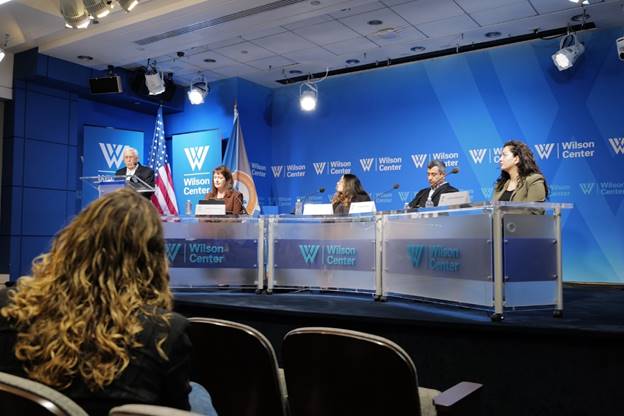
Calls for Reforms on Tenth Anniversary of Yazidi Genocide in Iraq
Report and photos by Phil Pasquini
Washington: As the genocide in Gaza and the war in Ukraine continue to dominate global headlines, and as the Middle East nears an all-out war after Israel’s attacks in Lebanon and Iran, the Yazidi religious minority community sadly commemorated the tenth anniversary of their all but forgotten genocide in Iraq.
On July 30 at the Wilson Center, a panel of four Yazidi experts discussed their just released policy paper “Ten Years After Genocide, the Yazidi Struggle to Recover.” Written by the panelists, the paper was described by co-author Pari Ibrahim as a “guiding document of what the Yazidis want” and explained that the thoughts and concerns contained within also included those of community members.
In his opening comments, Former Rep Frank Wolf (R-VA) called for the need of a special envoy, security and justice for the Yazidis in the 2014-2017 ISIS genocide. Saying he believes that the US government “has failed the Yazidi people and also the Christian community,” Wolf, who was instrumental in creating the Baker-Hamilton Commission (aka Iraq Study Group), and author of the International Religious Freedom Act, or IRFA, noted these communities “still face severe difficulties.” Those conditions have in turn resulted in many Yazidis leaving Iraq for Europe and the US.
Wolf referenced the “lack of security, damaged or destroyed homes, minimal job opportunities, lack of healthcare, education and access to drinking water” as motivating factors for the exodus. He stressed on the political level the need for Yazidis to assume “leadership positions at the federal level in Baghdad,” describing them as an “underrepresented minority.”
Wolf called on President Biden to act now in issuing an executive order that would mandate a solution by “directing the Secretary of State to work on solving these problems quickly as time is running out.”
Panelist Murad Ismael spoke on the critical issue of safety facing the Yazidis remaining in Iraq by recalling that since 2014 half of the Yazidi population has left the country due to continued security concerns. Since the post-ISIS era of 2014 “the killing and enslavement of about 10,000” Yazidis along with a “political security vacuum” has resulted in their not felling safe in returning to the former Yazidi area of Sinjar in Northern Iraq that many still consider a “conflict zone.”
Ismael further stated that “Iraq does not know what it wants to be” and offered two versions – one of a peaceful nation “where everyone lives in dignity…a state of law and order,” or a partial one run by militias as a “parallel state.”
Panelist Pari Ibrahim said that Yazidis want to move back to Sinjar but “need a future,” noting that people are clearly unsure in knowing, too, when another genocide could take place. She said that the solution to a safe and secure future is within Iraq, with Iraqis and not the international community.
On another principal issue she stated: “The Iraqi government wants to close down the [refugee] camps” in reference to the IDP camps housing Yazidi internally displace refugees, where people have lived in tents for the past ten years saying that the closure, which was scheduled for July 30 had been delayed. “While people do want to leave the camps, and not lose their land” their return needs to be “voluntary, dignified and safe” she said.
For its part, the Iraqi government she said offers $1,300 to those willing to relocate but that “it cost $300 just to move their goods back to Sinjar.” Thusly describing the offer as “Not realistic to ask our people to return for such a small amount of money.”
Regarding the Yazidi Survivors Law passed by the Iraqi parliament for reparations to survivors of the genocide, Ibrahim said that tens of thousands of Yazidis had applied for payments but that “none of these claims have gone anywhere.” She said that while “Sinjar is not being rebuilt, Mosul has been receiving reparations and is being rebuilt,” a condition that she attributed as “very visible that Yazidis are not wanted.”
When asked by moderator Nadine Maenza how the US government could do better to help the Yazidi community and build political will, panelist Murad Ismael responded by saying that “It should have been done years ago.” In speaking on accountability for the “one million crimes committed during the genocide,” he said that there had only been ten trials and now that amnesty is being discussed for ISIS the $120 million that was expended to collect evidence “will be thrown through a window.” He went on to say that regarding the genocide, “There is no recognition inside of Iraq of what happened.”
Panelist Natia Navrouzov also pointed out the endemic corruption in Iraq and called for the enforcement of proper vetting and processing of reparation claims for the people it is meant to support.
The group is hoping that their policy paper will be instrumental in resolving their rapidly eroding situation in Iraq by assisting in the formulation of policies guaranteeing their protection and in offering a promising future.
(Phil Pasquini is a freelance journalist and photographer. His reports and photographs appear in the Washington Report on Middle East Affair, Countercurrents, and Nuze.ink. He is the author of Domes, Arches and Minarets: A History of Islamic-Inspired Buildings in America.)

